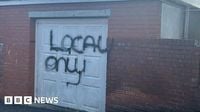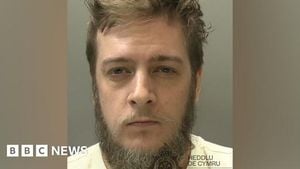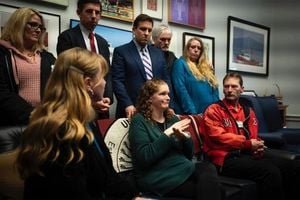Residents in parts of Northern Ireland are grappling with a surge in racially motivated attacks, leaving entire communities on edge and prompting urgent calls for action from local officials and police. The latest incidents, which unfolded in north Belfast and Donaghadee at the end of August 2025, have reignited longstanding concerns about hate crimes, social division, and the need for meaningful community dialogue and investment.
According to BBC News NI, a series of criminal acts occurred in north Belfast on August 28, 2025, shortly after 11:05 p.m. BST. In one particularly distressing event, graffiti was painted on a house in the Manor Street area, its windows were smashed, and a nearby parked car suffered damage. The words "locals only"—scrawled in bold black paint—served as a chilling message to residents, some of whom have already felt like prisoners in their own homes in recent months.
But the Manor Street attack was not an isolated incident. Police reported that two additional properties—one also in Manor Street and another in Summerhill Court—were damaged that same night. Investigators are now exploring potential links between all three attacks. BBC News NI has confirmed that while two of the properties were vacant, a family was living in the third at the time of the incident, amplifying the sense of vulnerability and fear among locals.
Independent Councillor Paul McCusker did not mince words when describing the emotional toll on the neighborhood. Speaking to BBC News NI on August 31, he said, "There has been an escalation of race attacks in the area recently," adding that many residents are "living like prisoners in their own home." He continued, "The amount of fear that people are living in at the minute is quite frightening. People should be able to live where they want to live, and now we've seen people have to move out and people living in fear every single day."
McCusker went further, calling on unionist politicians to "step up and actually put an end to this." He highlighted the deep-rooted divisions in north Belfast, noting, "There's more peace walls here in north Belfast, but that does not give anybody the excuse to go out and intimidate and cause this harm." The peace walls, originally erected to separate communities during the Troubles, now stand as a stark reminder of ongoing sectarian and racial divides.
These recent attacks echo earlier events from May 2025, when families in the nearby Annalee Street and Alloa Street areas—targeted in sectarian-motivated attacks—planned to leave their homes. The repeated targeting of both occupied and vacant properties has fostered an atmosphere of dread, with some residents contemplating relocation for their own safety.
The police have responded with strong condemnation. PSNI Chief Inspector Mullan stated, "There is no place in our society for this type of intimidating behaviour and we will continue to engage with local representatives and partner agencies around community safety." The police presence has increased, and officers are working closely with community leaders to address residents' concerns and prevent further incidents.
However, the conversation about solutions has revealed some political fault lines. Democratic Unionist Party (DUP) Councillor Jordan Doran condemned all threats of violence unequivocally, saying, "All threats of violence are absolutely wrong." Yet he also cautioned against what he called "elected representatives stealing soundbites for headlines, and condemning from afar." Doran argued that, "It isn't useful to talk about a community instead of to a community," and called for a much-needed "conversation about chronic housing shortage, lack of investment and much-needed regeneration in the area." For Doran and others, the roots of these hate crimes are entangled with broader issues of social deprivation, housing scarcity, and the absence of economic opportunity.
Just two days after the Belfast attacks, another racially motivated hate crime shocked the community of Donaghadee, County Down. According to police reports, on August 30, 2025, just before 9:55 p.m., a property on Killaughey Road was targeted: a window was smashed, and graffiti was daubed on the wall. The PSNI, quoted by BBC News NI, said, "We are treating this attack as a racially-motivated hate crime." Thankfully, those present in the property were uninjured, but police underscored that "we could potentially have been dealing with more serious consequences."
Investigators are appealing for information, especially from anyone who may have seen a person dressed in dark clothing riding an electric scooter in the area at the time of the attack. The police expressed gratitude for the local residents who condemned the crime and showed support for the affected family, emphasizing, "Everyone, no matter what their background, has the right to feel safe in their home. We are tireless in our pursuit of those responsible for any hate crime."
These incidents have highlighted the persistent challenge of hate crimes in Northern Ireland. While the vast majority of residents in both Belfast and Donaghadee have condemned these acts, the damage—both physical and psychological—lingers. The fear is palpable, especially for families who have already endured sectarian or racial intimidation in the past.
Community leaders and police alike stress the importance of solidarity and open dialogue. As Chief Inspector Mullan put it, there is no room for "intimidating behaviour" in society, and building trust between law enforcement and residents is key to restoring confidence. Yet, as Councillor Doran pointed out, addressing hate crimes also requires confronting the underlying social and economic issues that can fuel resentment and division.
For now, residents are left to grapple with the aftermath. Broken windows and hateful graffiti are stark reminders of the challenges that remain. But in the face of fear and intimidation, many community members have stepped forward to support one another, determined not to let hate define their neighborhoods.
The path forward will require more than police investigations and political statements. It will demand sustained engagement, investment in housing and regeneration, and above all, a collective commitment to ensuring that every resident—regardless of background—can feel safe and welcome in their own home.




